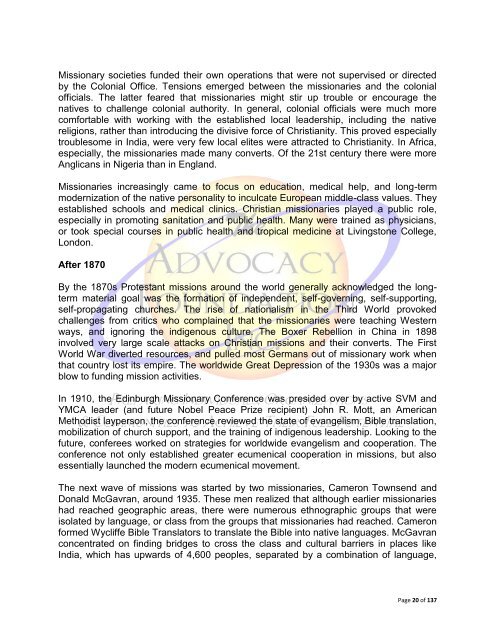The Theology of Missions
The Theology of Missions
The Theology of Missions
You also want an ePaper? Increase the reach of your titles
YUMPU automatically turns print PDFs into web optimized ePapers that Google loves.
Missionary societies funded their own operations that were not supervised or directed<br />
by the Colonial Office. Tensions emerged between the missionaries and the colonial<br />
<strong>of</strong>ficials. <strong>The</strong> latter feared that missionaries might stir up trouble or encourage the<br />
natives to challenge colonial authority. In general, colonial <strong>of</strong>ficials were much more<br />
comfortable with working with the established local leadership, including the native<br />
religions, rather than introducing the divisive force <strong>of</strong> Christianity. This proved especially<br />
troublesome in India, were very few local elites were attracted to Christianity. In Africa,<br />
especially, the missionaries made many converts. Of the 21st century there were more<br />
Anglicans in Nigeria than in England.<br />
Missionaries increasingly came to focus on education, medical help, and long-term<br />
modernization <strong>of</strong> the native personality to inculcate European middle-class values. <strong>The</strong>y<br />
established schools and medical clinics. Christian missionaries played a public role,<br />
especially in promoting sanitation and public health. Many were trained as physicians,<br />
or took special courses in public health and tropical medicine at Livingstone College,<br />
London.<br />
After 1870<br />
By the 1870s Protestant missions around the world generally acknowledged the longterm<br />
material goal was the formation <strong>of</strong> independent, self-governing, self-supporting,<br />
self-propagating churches. <strong>The</strong> rise <strong>of</strong> nationalism in the Third World provoked<br />
challenges from critics who complained that the missionaries were teaching Western<br />
ways, and ignoring the indigenous culture. <strong>The</strong> Boxer Rebellion in China in 1898<br />
involved very large scale attacks on Christian missions and their converts. <strong>The</strong> First<br />
World War diverted resources, and pulled most Germans out <strong>of</strong> missionary work when<br />
that country lost its empire. <strong>The</strong> worldwide Great Depression <strong>of</strong> the 1930s was a major<br />
blow to funding mission activities.<br />
In 1910, the Edinburgh Missionary Conference was presided over by active SVM and<br />
YMCA leader (and future Nobel Peace Prize recipient) John R. Mott, an American<br />
Methodist layperson, the conference reviewed the state <strong>of</strong> evangelism, Bible translation,<br />
mobilization <strong>of</strong> church support, and the training <strong>of</strong> indigenous leadership. Looking to the<br />
future, conferees worked on strategies for worldwide evangelism and cooperation. <strong>The</strong><br />
conference not only established greater ecumenical cooperation in missions, but also<br />
essentially launched the modern ecumenical movement.<br />
<strong>The</strong> next wave <strong>of</strong> missions was started by two missionaries, Cameron Townsend and<br />
Donald McGavran, around 1935. <strong>The</strong>se men realized that although earlier missionaries<br />
had reached geographic areas, there were numerous ethnographic groups that were<br />
isolated by language, or class from the groups that missionaries had reached. Cameron<br />
formed Wycliffe Bible Translators to translate the Bible into native languages. McGavran<br />
concentrated on finding bridges to cross the class and cultural barriers in places like<br />
India, which has upwards <strong>of</strong> 4,600 peoples, separated by a combination <strong>of</strong> language,<br />
Page 20 <strong>of</strong> 137

















